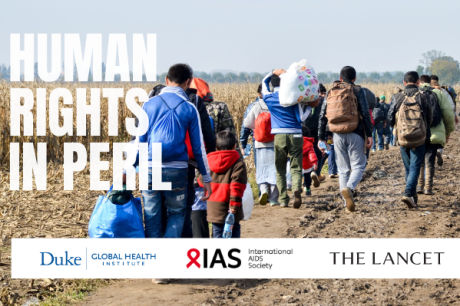In 15 years of working alongside health researchers in Kenya, Wendy Prudhomme O’Meara has seen an all-too-familiar pattern: An outside organization comes in to collect health-related data in the country and then retains sole ownership of the data despite the collaboration of others involved, including the people who provided the data in the first place.
When this occurs in the context of a historical power imbalance, the practice has become known as “data colonialism,” and a growing contingent of global health researchers are speaking out against it. They are promoting more equitable data governance policies as a necessary new normal.
O’Meara, associate director for research at the Duke Global Health Institute (DGHI), and other team members in DGHI’s Research Design & Analysis Core (RDAC), are leading voices calling for change. The team is developing resources for international researchers at Duke and beyond to help them think through how research data is collected, used and shared.
“Research data governance can feel almost mystifying because there are so many factors in play,” says Sabrina McCutchan, a data analyst with RDAC who developed a white paper on the issue that the team is sharing around the research community.
“With this landscape analysis, we aim to inform internationally collaborating teams about those factors so that everyone can navigate them together. Our hope is that teams will develop an understanding of what different stakeholders — individual researchers, institutions, governments, funders and communities — want from data, and what tradeoffs, benefits or even harms can arise from seemingly mundane governance decisions,” McCutchan says.
The group also hosted a discussion on Sept. 29 as part of DGHI’s Think Global speaker series. The event, titled “Extractive Global Health: Data as a Commodity,” featured a talk by Bethany Hedt-Gauthier, a biostatistician and associate professor of global health and social medicine at Harvard University, followed by a panel discussion exploring equitable data practices. (See below for a recording of the event and highlights from the discussion.)
The goal of both the event and the white paper is to spark a conversation about how data might become a resource that gets unequally distributed and what can be done to prevent that from happening, O’Meara says. “We feel that the global health institute’s responsibility is to try to incorporate the partnership perspective in these data conversations.”
The group’s recommendations offer a counterpoint to the “FAIR Guiding Principles for scientific data management and stewardship,” published in the journal Scientific Data in 2016, says O’Meara. The guidelines emphasize accessibility and reuse of data, which O’Meara notes is good for transparency and rigor, but can diminish local stakeholders’ control over how the data is used. This can perpetuate power imbalances in global health partnerships and jeopardize benefits local communities may receive when working with external partners.
O’Meara has seen firsthand the divisions that inequitable data collection and analysis practices can create. For more than 15 years, she has lived and worked in Kenya with Moi University, studying malaria transmission, diagnosis and treatment. She can recall multiple instances in which international partners sought to gain exclusive access to the data collected in the community there.
“For one project, we collected data about 80,000 people in the community every six months. On several occasions, a funding partner would insist that data be handed over and stored in their servers so they could have unrestricted access,” says O’Meara. “In some instances, the partnership would dissolve because the parties couldn’t come to an agreement on data ownership issues. To the Kenyans, it felt very exploitative and extractive, and from the perspective of the collaborators, they felt that they should be able to have access to the data because they had the resources to analyze it.”
O’Meara admits that the issues around data policy and governance are complex and that she doesn’t have all the answers. Her team’s next step is to prepare shareable case studies from within DGHI that provide positive examples of the types of data governance that steers research communities away from data colonialism and toward a more equitable future.
“We definitely want to point to this issue and foster conversation around it in a productive way,” says O’Meara. “You know, at DGHI we’re not perfect and there’s such a huge diversity in projects and styles and partnerships. But I do think most of our faculty is really aware of the importance of these concerns, and that there is no room for extractive research within our institute.”
Extractive Global Health: Data as a Commodity
See below for a recording and highlights from DGHI's Sept. 29 Think Global event, titled “Extractive Global Health: Data as a Commodity.”
Highlights
“We felt a need to more deeply examine the ways we use and share data to ensure our practices are a reflection of our core values…. We remind ourselves that data shouldn’t just have maximum benefit to society in general, but should also benefit the communities where the data was pulled from. That community should feel empowered to be part of the story and use the data and consume the data. We need to address issues around data ownership.”
—Wendy Prudhomme O’Meara, associate director for research, DGHI
“Cultural capital, social capital, financial capital and symbolic capital influence how we share data, who we invite to talk at events. These forms of capital are influenced by colonialism, racism and sexism. We can’t talk about sharing data openly without talking about how sharing data is rooted in colonialism.”
--Bethany Hedt-Gauthier, biostatistician, Harvard University
“Equitable data practice shows that if we are on the receiving end, we will like what’s happening. One discussion I had in a country I worked in, someone asked me if I was from a LMIC in a high-income country doing research, what would that look like? Collecting data and storing it outside the country and not having it for the high-income country? If we do equitable data practice and we’re on the other side, we should feel confident in what we’re doing.”
—Osondu Ogbuoji, deputy director, Duke Center for Policy Impact in Global Health
“I think it’s not a one-size fits all. When we think about engaging with other partners, it’s important we make them part of the process and understand it. It’s important to gather the local perspective, involve researchers and ministries of health so we can try to get what is important and address any local challenges they have. It’s important to have this equitable use of data.”
—Thiago Hernandes Rocha, advisor on health data analysis for the Pan American Health Organization
“The value we give to data should be shared jointly by everyone. Why it might be important to someone in academia, someone in the industry might see data and think about profits…. We should make sure the ones in the room making the decision about data and its value should be as diverse as possible. We should not neglect the voices of those who are closest to the problem. We should listen more to our partners. They know a lot. And overtime, we will do a better job.”
—Osondu Ogbuoji
“Make allies where you can and shake cages where you can’t. This is not always a smooth pathway within my own institution. Sometimes, you need to elevate the issue and shake a few cages to make sure that changes can be made.”
—Bethany Hedt-Gauthier



